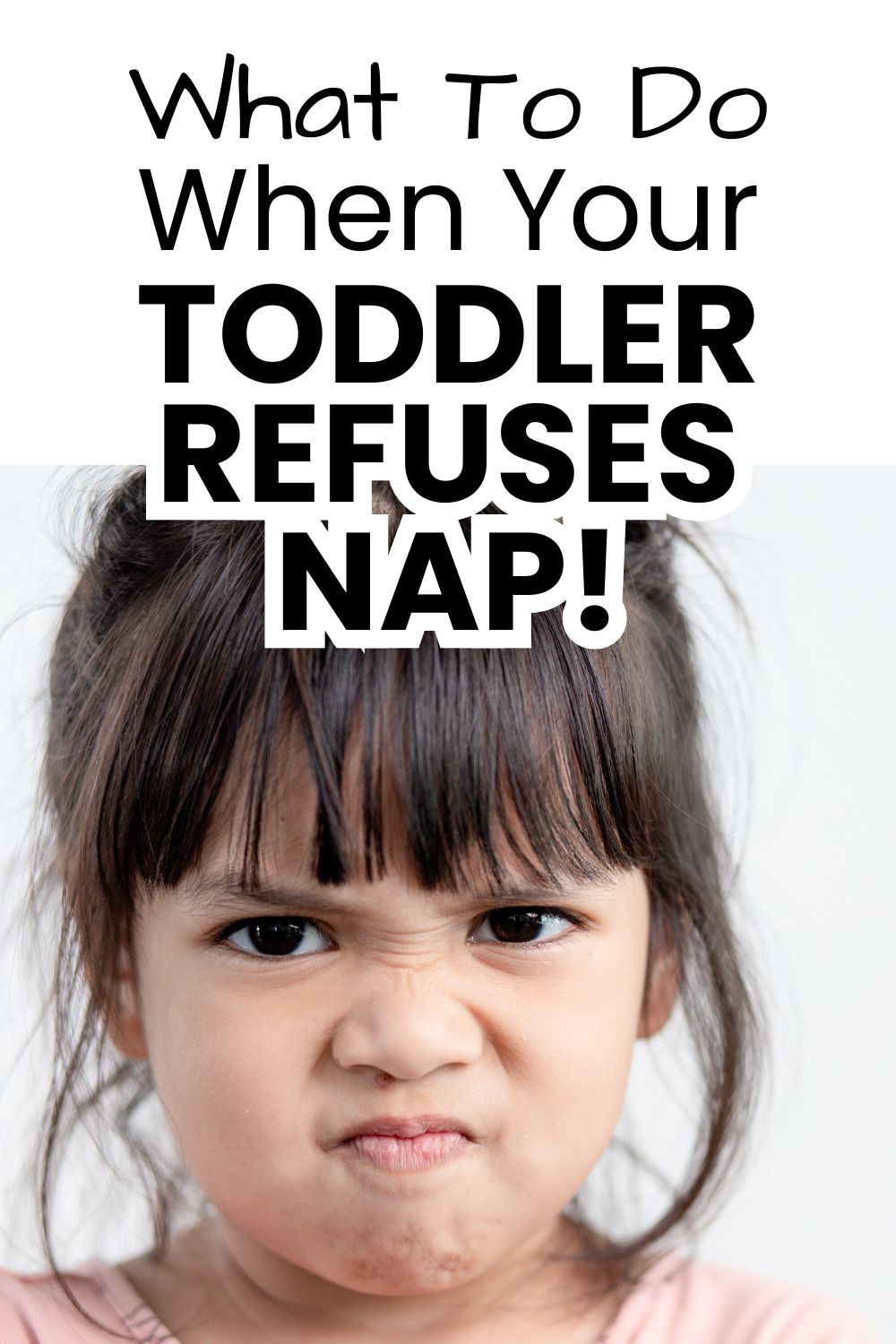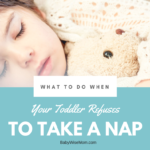Is your toddler resisting naps? Don’t ditch nap time just yet! Learn why naps are still essential for young children, how to handle nap refusal, and tips to improve your toddler’s sleep routine.

“But I don’t want to sleep! I want to plaaaayyyy!” Does this phrase have a familiar ring to it? It is quite common for a toddler to start to decide nap-time is not quite fun-time. Staying awake is much more exciting and interesting.
You might take this resistance to nap time as a sign that it is time to drop naps all together. (This post contains affiliate links). Before you take that step, please reconsider! In the book Healthy Sleep Habits, Happy Child, Weissbluth says, “Between twenty-two and thirty-six months, most children still need to nap” (page 313). I fully agree with this. Wants and needs are very different things, and just because your child doesn’t want to nap, doesn’t mean your child doesn’t need to nap. Your toddler’s sleep needs means that in order to get enough sleep in a 24 hour period, a nap is still required.
Of course, the process of keeping the nap in place is easier said than done. So what should your do when your child wants to drop that nap but you still need nap to happen? Let’s discuss common reasons for sleep issues and how to address them.
Post Contents
1-Do Not Drop the Nap
I have been told how lucky I am that my children nap until they are quite old. This is no luck! Do not not be fooled; I have had some resistance to naps over the years. Of course a toddler has better things in mind other than napping! They want to delay, prevent, and stop the nap at all costs. Little toddlers get quite creative. Some get quite angry.
But you don’t drop it. You stick with it. Keep nap time in place if you want nap time to continue.
For help knowing when to drop naps, see my post on how to know when your child is ready to stop napping. When your child is ready to cut back on napping, implement rest time. You have some time yet before you will be totally dropping this chunk of time in the afternoon known as nap time.
Why Not Drop the Nap?
You might be thinking the effort to keep the nap is too great or that it would actually be really nice to be done with naps. So why not just drop it?
Dropping sleep before the child is ready for it leads to a sleep deficit. Sleep begets sleep, and in the same way, lack of sleep leads to lack of sleep. The child who should be napping but isn’t will eventually start having a hard time falling asleep at night or start waking earlier and earlier in the mornings. Sleep deficits usually take a few weeks to build up, so you often don’t put the cause and effect together.
2-Have Enough Physical and Mental Stimulation
Your child will sleep better if you have some activity in the morning that challenges her mentally. Learning activities will help work her brain and give her body need of sleep to process what she has learned. You also want physical movement. Gross motor movement really helps kids sleep better. Go for a walk. Blow bubbles for her to chase. Get a little trampoline for inside the house or a ball house so she can move and get physically tired.
3-Analyze Nap Start Time
Your child will show the least amount of resistance to nap time if you get the start time of naps correct. This takes us back to thinking about waketime length just like we did with babies. Overtiredness can still disrupt sleep for toddlers. Some children are incredibly sensitive to the timing of this nap. When Brayden was a toddler, we had a ten minute window, and if I didn’t meet it, nap didn’t happen that day. He stayed awake. Keep a log and find patterns for when nap works and when it doesn’t.
Along this same line of thinking, you want to make sure you still have a nap routine in place for your toddler. A naptime routine will indicate it is nap time and help your toddler settle down for a nap.
Nap refusals can also be an issue if your toddler has too many daytime naps in the day. It might be time to adjust your nap schedule and move to one nap a day and just have the afternoon nap.
It is also good to be aware that it is very normal for a 2-year-old to just not nap every day. That is common and nothing to stress out about.
>>>Read: Sleep Totals: How Much Sleep Should Your Child Get?
4-Analyze Bedtime
A possible reason for no naps is having bedtime either too early or too late. It can be either one, so you will need to experiment with earlier or later bedtime to see if that solves the issue.
Just as a nap routine is still important before nap time, a bedtime routine is important before bedtime. This can be the exact same as your nap routine or it can be different. A bedtime routine helps prepare your toddler for solid nighttime sleep.
You want to be aware of how many hours of sleep your toddler should be getting in a 24-hour period. If you are pushing for too much sleep, your toddler will not sleep well at nap time. A toddler should be sleeping 10-12 hours at night and taking naps that are 1.5-3 hours long.
5-Be Honest With Yourself
Weissbluth says, “Ask yourself whether napping is your child’s problem or your problem” (page 327). This is a moment where you need to be really honest with yourself. Do you have a hard time being home each day for nap time? If so, you are not providing the consistency your child needs to get a nap in. I promise your day will come when you will have the freedom to take off and go shopping, go out to eat, or just run errands during the afternoon. For now, get out in the morning hours if you must get out and be home in time for nap.
6-Be Aware of Sleep Regressions
Two year olds often have a sleep regression. It is normal, it happens, and it isn’t anything to freak out about. Remember back to the four month sleep regression? Baby’s sleep went crazy? You are facing the same thing now with toddler sleep regressions. Sometimes the answer is to just keep going as you have and wait for the regression to end.
7-Address Sleep Disruptions and Distractions
There are many things that can and will disrupt a toddler’s sleep. One thing can be toys. Are there toys in the bedroom that tempt your child to get up and play? Are there toys in your toddler’s bed that your kiddo plays with rather than sleep?
On the flip side, sometimes adding a toy to the bed helps your child blow off some steam as they wind down and get ready to nap. I prefer a book in bed rather than a toy, but some toddlers love a stuffy or lovie.
Your toddler might be ready to move out of the crib. The crib can get to be too small and uncomfortable for your toddler. Sometimes moving out of the crib makes it hard for a toddler to sleep because they suddenly want to test the boundary of the bed and get out over and over.
Potty training can also disrupt nap time. If your kiddo is napping in underwear, they can use the need to go potty as an easy easy to get out of bed over and over again rather than sleep.
Daylight can make it hard for your toddler to have daytime sleep or to sleep in the morning. Blackout curtains offer an easy fix to help with this.
You might also find your toddler very distracted by other noises in the house or outside and find white noise machines help block that noise so your toddler sleeps well through a sleep transition.
You always want to analyze a child’s sleep environment when sleep is rough.
Another thing to think about is any big changes in your toddler’s life. It is common for a toddler to suddenly (to them) have a new sibling or mom is pregnant and they have a new routine. Have patience with your toddler as they adjust to the changes in their life.
Conclusion
Your toddler won’t always thank you. Your toddler probably won’t thank you at all for requiring sleep! Tantrums can be very normal at nap time. When your little one emphatically proclaims that she doesn’t want to sleep, gently tell her you know that, you understand it, but her body needs sleep. Having that sleep will help avoid irritability in the evenings and prevent your toddler from becoming overstimulated. At the very least, time spent in the bed is good quiet time that allows for rest and recovery.
Related Posts
- 18 Month Sleep Regression: How to Help
- 2 Year Old Sleep Problems – How To Solve Them!
- How Do Toddlers Act When Tired
- How To Deal with the 2 Year Old Sleep Regression
- How to Know When Your Child is Ready to Stop Napping

This post first appeared on this blog in February 2017



Hi recently my 2 year old has started refusing to nap at preschool. She is 31 months now and she has been in some form of preschool/daycare since 18 months. They put them down at 1pm. She has a cot with a pillow and a blanket and she has a pacifier elephant identical to her one in her crib. She has had hard times in the past transitioning to new situations but has never not napped for this long. She ends up taking 2.5 naps on the weekend bc she is so tired! They have tried giving her a white noise machine and reading a book to her before nap to try and help her nap but she comes home everyday exhausted. Before I start to pick her up everyday at 1 and just do naps at home I wonder if there is something else I can try. I work from home so I can do nap at home but it is really hard to get work done so I would prefer her to stay in school but I just don’t know what else to do at this point. She’s been potty trained for 4 months and we just had her baby sister 8 weeks ago.
I honestly think this is a really hard situation to have a toddler sleep. Toddlers are so very curious that being in a room with other toddlers would be so interesting and hard to really settle down and sleep.
If they will not allow her to be there unless she sleeps, you might need to bring her home for nap.
If they will let her stay even if she doesn’t sleep, then I would bring her home for naps most days, but maybe have one or two days she stays there so you can get some work done more easily. She is at an age where she can skip a nap 1-2 times a week with no issue.
Read these posts to see if they strike any ideas: https://www.babywisemom.com/managing-babywise-with-daycare/ and https://www.babywisemom.com/daycarechildcare-and-babywise/
My 3 yr old toddler recently went from napping two hours if allowed to refusing to nap without a struggle. This happened when we stopped finger sucking (dentist recommended). What can we do to help him settle down before nap time and bedtime now?
Hello! He is going to have to learn a new way to self soothe. Focus on having a very solid sleep routine that helps him get settled for sleep. A lovey of some sort might help him out to focus on that rather than the finger sucking.
Hi, thank you for the advice in this article. My 27 month old abruptly started refusing naps and screams angrily and cries. He has no problem going down at night. I’m trying to stick with the routine but I’m also afraid of giving sleep a negative feeling. Even going in his room during the day has become a big NO. Looking for advice on how to keep it positive.
Any time there is a sudden change in sleep with nothing that seems to explain it (like traveling or moving), I always check for pain or sickness first. Teething? Ear infection? I would rule those and other sickensses out before taking further steps.
Please help! My son is 25 months old and has always slept well. We’re very consistent with routines around sleep but two weeks ago he started throwing tantrums when I put him in bed. No sickness, teething, changes, etc. I have tried a few things but I am afraid to create bad habits now, so I don’t know how to proceed. He seems to want my presence (to lay on the floor with me) but we’ve never done that before. If I leave him in bed, he screams for as long as I let him. How do I enforce the nap without compromising our previous good habits or leaving him to scream, which I can’t do?
Hi Erin, First, you said no sickness, but I do want to make sure there isn’t an ear infection. That is such a common cause for poor sleep with toddlers. If nothing is wrong, I would make sure he is getting enough mental and physical stimulation. I would also consider moving nap 10-15 minutes later in the day to see if he will be fine with a little later nap start time. I would still end his nap at the same time. Also, I would just go in, tell him it isn’t okay to scream and yell, and it is time to sleep. Does he have any books with him in bed? If not, you could give him some books to look at until he fell asleep. You could even let him have a safe toy in bed to keep him company if he doesn’t have one. Also, be sure to see this post: https://www.babywisemom.com/two-year-old-sleep-regression/